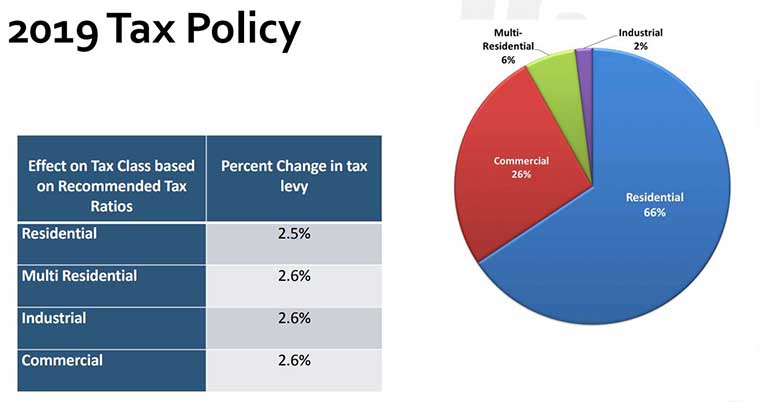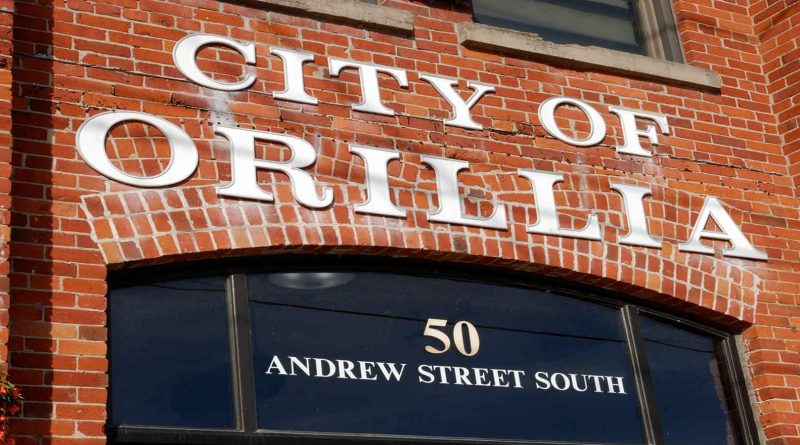Council Preview
By John Swartz
Orillia council’s meeting schedule starts at 5:30 p.m. with a budget committee session on tax policy.
We already know the municipal budget went up 3.25 % because of budget increases from other agencies (County of Simcoe for instance), but when combined with a lower tax bill for education, the effective increase is 2.5% on residences, while multi-residential, commercial and industrial assessments go up 2.6%. So, for each $100,000 of property value for tax purposes on a residence, bills will increase by $35.
There are some interesting bits of information from treasurer Jim Lang’s report that affect property taxes now, and in years ahead. One is appeals. The province put in new rules for appeals last year and one result is municipalities can expect to have higher costs to defend assessments – which of course are funded by property taxes. Orillia has 230 appeals underway, some going back as far as 2013. The assessed value of properties in play is $2.1 billion and, which means about $3 million of tax is in question.
The breakdown for who pays the bills in Orillia is residential – 66%, commercial – 26%, multi-residential 6%, and industrial – 2%.

Building Hope
When the regular council meeting starts at 7 p.m. proceedings will go straight to reports because there are no deputations or presentations scheduled. One item returning from previous meetings is the issue of concessions to the Building Hope project. Council had been asked to grant $408,000 of development charges and waive $633,493 of securities to be posted (cash or letter of credit) for the project. That is the motion in the agenda.
The security may never be used, resulting in Building Hope parking money over the course of construction. However, should the City order additional work to correct elements of construction the money normally would come from a security.
The development charge has to be paid, by some entity, so if the City grants the money it would likely come from the major capital facilities reserve, which is currently $38 million overdrawn (internal borrowing, not from lending institutions).
However, staff are recommending receiving the report as information, which means no grant, no waiver. Their second option mirrors the motion published in the agenda to grant development charges and waive the security.
Health Care
Also on the agenda is a notice of motion from Councillor Ted Emond on a subject with moving parts. The province has announced they are restructuring healthcare. The province wants to set up 30 to 50 Ontario Health Teams (OHT) across the province. At the moment, they are leaving it up to local areas to organize and apply for designation as an OHT. These are integrations of various parts of the current system (doctors, hospitals, long term care, LHINs, home care, public health, and other agencies) which operate separately and are funded separately, into one mammoth organization.
Mammoth in the scale of Orillia, surrounding townships and Rama into something currently called the Couchiching region. Aside from adding another name to refer to the same geographic region, the intent is to create one entity, one path, for patients to deal with for healthcare needs from cradle to grave. One advantage of the provincial move is centralizing healthcare records because currently bits and pieces of a complete picture are maintained within different organizations.
Each area has to apply by May 15 to be considered for designation, which presumes those areas of the province who don’t will have some measure of reorganization imposed. This is crucial to municipalities that lie between major centers, where they run the risk of being lumped in with OHTs not conforming to local practice (i.e. imagine if Orillia, or Washago, or Brechin had to join a Barrie centered OHT).
The motion asks the City to endorse the Couchiching application and appoint Emond as the City’s representative on the initiative (The LHIN for this area is large geographically and has a subcommittee, which Emond is on called the Couchiching Sub-Regional Planning Team).
It is expected it will take years for all the organizations and services to amalgamate as each fights to retain their operating share of a pie the province hopes will be smaller than the many approaches to funding currently in practice.
Whether or not the change in healthcare makes sense (many of the details are still in development) it does make sense for the City to be proactive by having a hand in developing what may be. At this point there is no budgetary effect on the City.
In By-Laws, one is for the City to approve the agreement of purchase and sale of 150 Front Street South (the old train station) to Tai Fac Chow. The closing date or sale price was not made available. Not on the agenda but in information circulated to councillors last week is 10 proponents had a site visit April 24 for the 70 Fronts Street South project and are eligible to make submissions for the Request for Proposal, which are due May 27. Staff will recommend up to 5 be considered by the Waterfront Working Group June 24.




